English Edition

- By CNI
- Category: English Section
- Hits: 389
CNI News
9 December 2025
There are ongoing analyses among military and political observers regarding what other strategic objectives the Kachin Independence Army (KIA) may have, in addition to seizing and controlling towns inside the Sagaing Region.
Currently, the KIA has expanded and operated across northern Shan State, Kachin State, and into the Sagaing Region, allowing it to stand as one of the strongest ethnic armed organizations.
Recently, KIA–PDF forces have taken control of Banmauk, Pinlebu, Indaw, Shwe Pyi Aye, and Khanpat townships in the Sagaing Region. From these positions, they are in a condition to continue launching attacks on Hkamti, Kawlin, Phaung Pyin, Tamu, and Kalay towns.
Analysts point out that if KIA can take control of Hkamti, it will effectively control the entire upper Sagaing Region. If it succeeds in taking Kawlin, it will likely attempt to expand control over Kalay, Tamu, and Kantbalu.
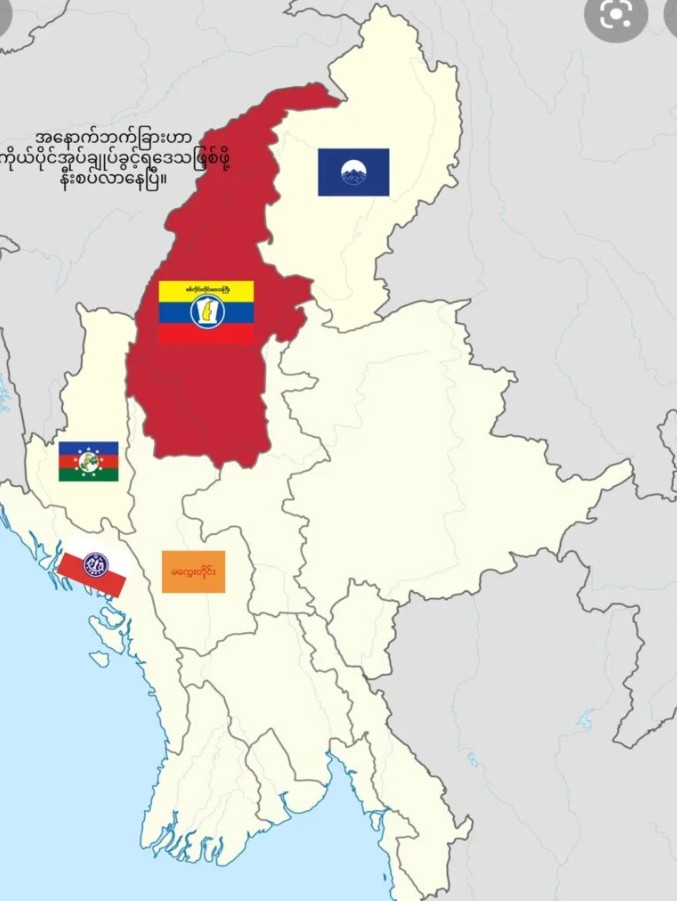
Map showing connected territories from Sagaing Region
According to U Khun Sai, a peace process expert, if KIA gains full control over the Sagaing Region, it will not stop there — because gaining such control would allow KIA to access neighboring countries through Chin and Rakhine States, facilitating both trade and diplomatic outreach with neighboring and Western countries.
He said to CNI News:“If they can control the Sagaing Region, they will get closer to India. From Sagaing, through Chin and Rakhine, they would gain opportunities for international trade and external relations, which would benefit them. Kachin, like Shan, is a landlocked state. So I don’t think the KIA will stop even after securing Sagaing Region. Even if they don’t continue capturing more towns militarily, they will still push to expand their influence, build relationships, and project power.KIA is not only careful and strategic in politics; they are also skilled in diplomacy. If they maintain relations with China on one side and engage India, the U.S., and other countries on the other side, their position becomes much stronger.Instead of being jealous of the Kachin, we should learn from their methods.”
The KIA has been providing military training, weapons, and ammunition to revolutionary forces in the Sagaing Region that border Kachin State. They have jointly conducted operations, captured towns, and expanded control across Kachin State and the Sagaing Region.
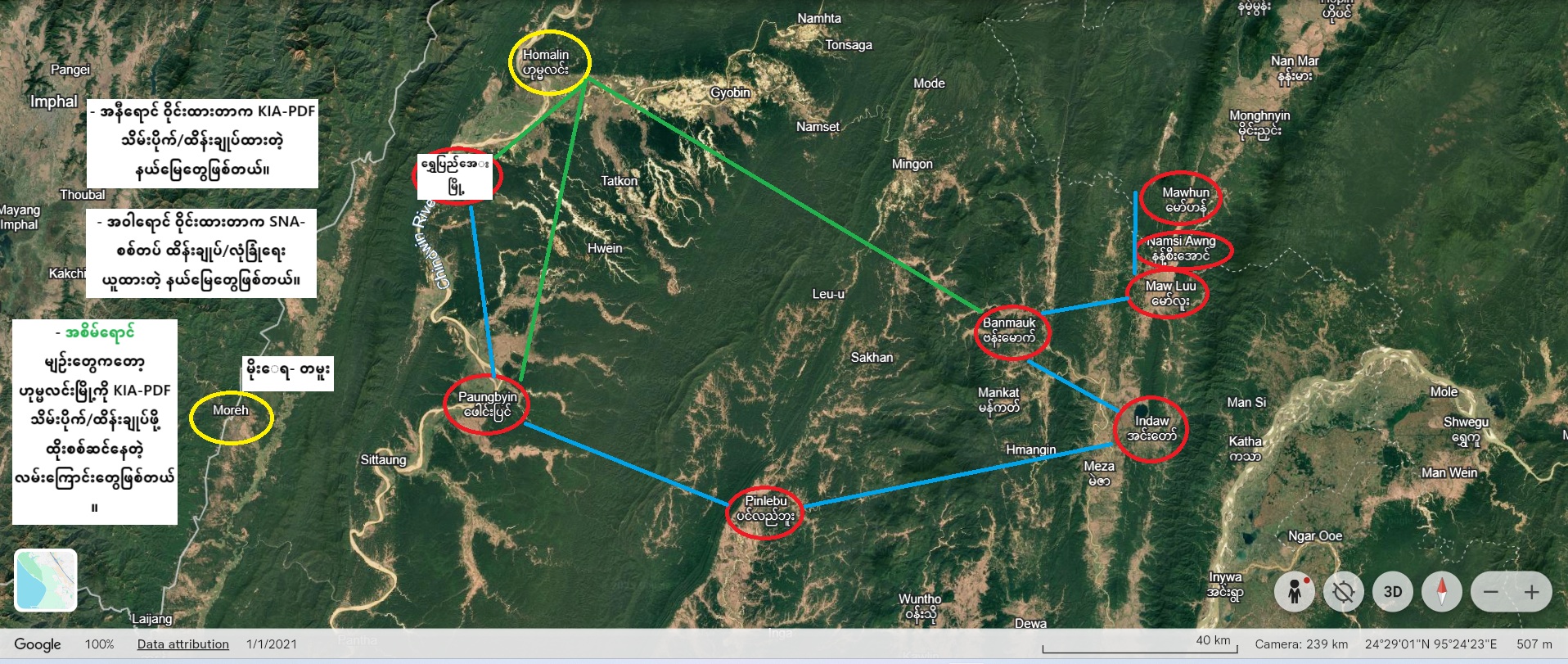
Towns in Sagaing Region captured by the KIA
Following the military coup of February 1, 2021, the KIA strengthened its forces and expanded its controlled territories far beyond previous levels.
The Sagaing Region has two border exits into India: The Tamu–Moreh crossing The Pansawng (Naga area) crossing, To secure the Tamu–Moreh corridor, KIA has been providing weapons and ammunition to the Kuki and PDF forces.
For the Pansawng (Naga) corridor, KIA has been working with NSCN-K/YA and NSCN-K/AM through recruitment and by supplying arms to ENDA/ENNO (Eastern Naga Defence Army) to implement its strategy.
A political analyst told CNI News that if any ethnic armed group captures territories beyond those designated under the 2008 Constitution and attempts to establish them as its own administrative region or state, inter-ethnic conflict could emerge — as seen in the case of the TNLA.
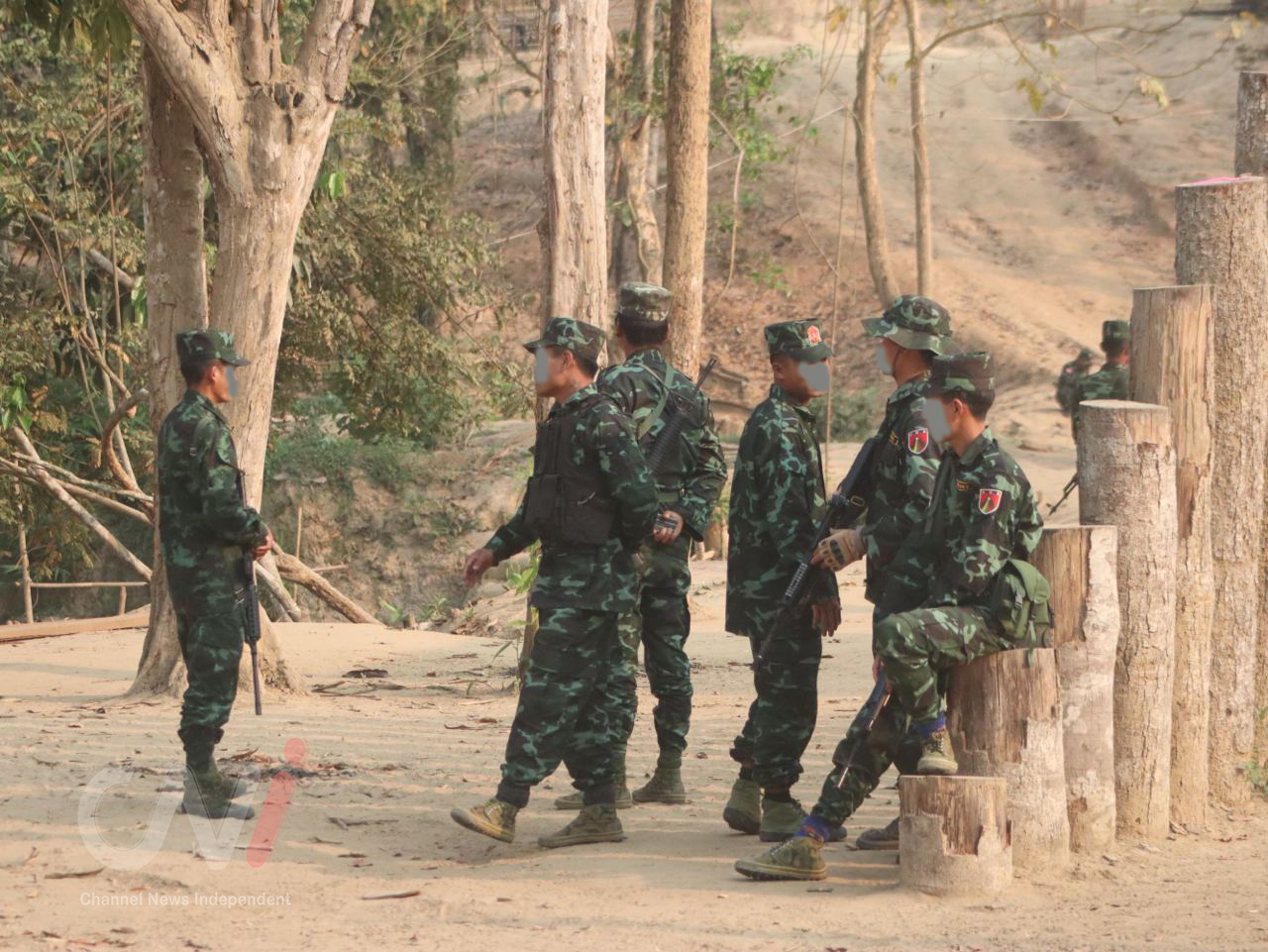
Shanni Nationalities Army (SNA) seen
He stated:“When ethnic armed groups capture territories and then declare them as their own state or region, TNLA’s experience can repeat itself — resulting in inter-ethnic conflict.The 2008 Constitution already lists recognized ethnic territories such as Kokang, Pa-O, Kachin, etc. The majority of people in Myanmar accept these official designations.So if any group tries to expand and claim new territory, making the same mistake as the TNLA, serious conflict between groups can emerge.AA, MNDAA, and TNLA do not explicitly promote federalism; they prefer a model similar to the Wa — controlling their own territory independently as a single-party armed administration.KIA previously accepted federalism and participated in NCA negotiations. But later, they withdrew. After Operation 1027 and subsequent political and military developments, KIA’s positions may change again.If they firmly commit to federalism, negotiating with the NUG and PDFs becomes much easier, with fewer major obstacles.”
According to analysts, the primary barrier preventing the KIA from fully controlling the entire Sagaing Region is the presence of the Shanni people and the Shanni Nationalities Army (SNA).
If KIA were to take over all of Sagaing Region, its power would surpass its current strength significantly. Analysts are watching closely to see whether the KIA’s strategies and operations will allow it to practically achieve full control over the region.

- By CNI
- Category: English Section
- Hits: 280
CNI News
9 December 2025
The military (Tatmadaw) will gradually reduce its inclusion in Hluttaw once democracy becomes established and once there are no more ethnic armed organizations in the country, said Senior General Min Aung Hlaing, Chairman of the National Security and Peace Commission.
He made these remarks on December 6, 2025, during a meeting with officers, soldiers, their families, and cadets from the Pyin Oo Lwin cantonment.
Senior General Min Aung Hlaing said:“When democracy flourishes in our country and when there are no ethnic armed groups anymore, the Tatmadaw will be able to gradually reduce its presence in Hluttaw. At present, because the Tatmadaw has to take a leading role in national politics, it is necessary for us to carry out our duties systematically and correctly.”
He stated that the Tatmadaw has historically participated in the leadership of national politics throughout successive eras, and based on historical and current circumstances, the military will continue to play a role in national political leadership.
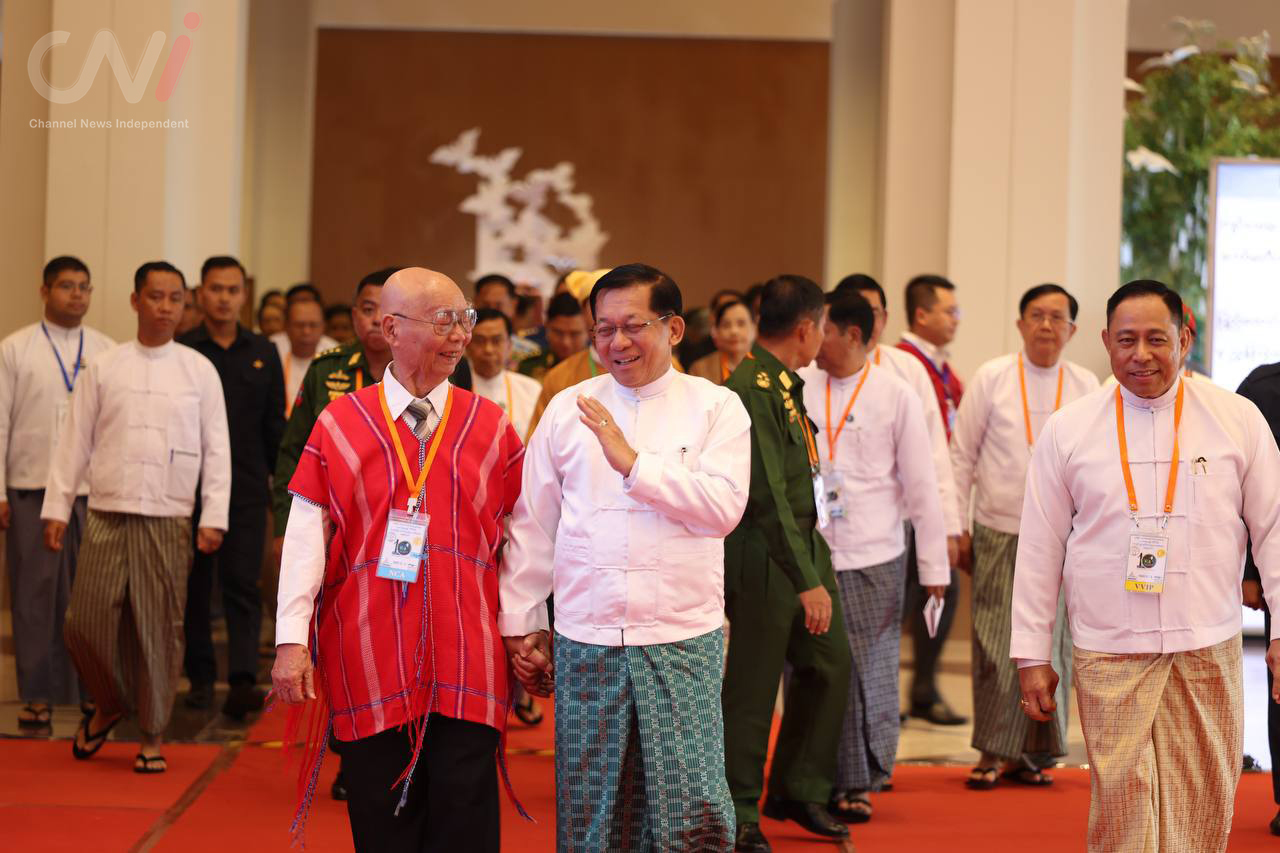
In Myanmar, the military occupies 25 percent of seats in the Regional/State Hluttaws, the Pyithu Hluttaw, and the Amyotha Hluttaw without contesting elections, as guaranteed by the 2008 Constitution.
Ethnic armed organizations and political parties have called for the military to withdraw these parliamentary seats or at least reduce the percentage.
The ethnic armed groups that signed the Nationwide Ceasefire Agreement (NCA) are:
RCSS, DKBA, KNU/KNLA-PC, ALP, PNLO, NMSP, CNF, ABSDF, LDU, and KNU.
Among them, KNU, CNF, and ABSDF have withdrawn, saying the NCA has already collapsed.
LDU, NMSP, PNLO, and ALP have split into two groups—those who want to remain in the NCA process and those who want to withdraw.
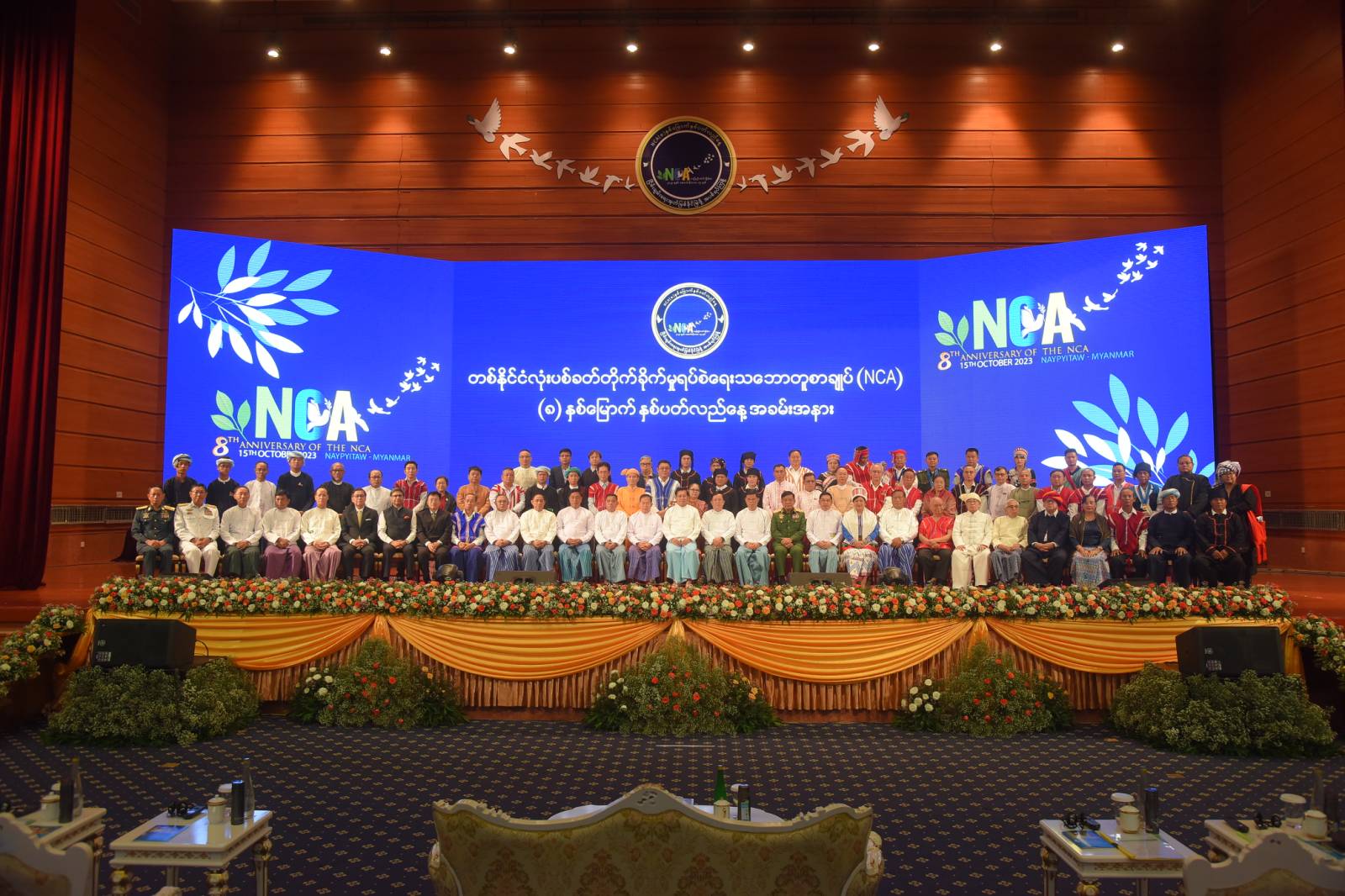
Ethnic armed groups that have not signed the NCA include:UWSA, NDAA (Mongla), SSPP, KIA, MNDAA, TNLA, AA, and KNPP.
Ethnic armed groups outside the NCA framework include:SNA/SNUC, KNA/KNO, ZRA/ZRO, ENDA/ENNO, NSCN-K/AM, NSCN-K/YA, and ANC.
Additionally, armed groups that emerged after the February 1, 2021 coup and the Spring Revolution include:BPLA, BNRA, KNDA, PLA, DPLA, MLA, MNLA-AD, MSDF, MSRF, KPDF, SAF, 96 Soldiers-PDF, as well as many PDFs in Chin State and numerous PDFs under the NUG across the country.

- By CNI
- Category: English Section
- Hits: 331
CNI News
8 December 2025
There are certain differences between the political objectives of ethnic liberation revolutions and those of the pro-democracy forces’ Spring Revolution, according to Colonel Khun Oakkar, Chairman of the Pa-O National Liberation Organization (PNLO – NCA/S), which is a signatory to the Nationwide Ceasefire Agreement (NCA). He said this in an interview with CNI News.
Following the political change after 2021, People’s Defense Forces (PDFs) emerged and have been fighting together with ethnic armed organizations (EAOs) to overthrow the Myanmar military (Tatmadaw).
Colonel Khun Oakkar of PNLO (NCA/S) said that the political aim of ethnic armed groups is to ensure national liberation and safeguard national interests.
He said:“The political objectives of the ethnic national liberation struggle and the Spring Revolution groups are a little different.The ‘Wa’, the Palaung, the Kokang—all of them are fighting because their political goal is national liberation and ensuring national interest. But they might not try to seize power in Nay Pyi Taw.However, the Spring Revolution forces' political objective is to seize state power. There’s no reason to object to that. But ethnic armed groups aim to protect their people’s equality, self-determination, stability, peace, and interests.So when the political objectives of both sides align, they cooperate; when they don’t align, they separate.They work together when the goals coincide, and when they don’t, they go their separate ways.Because of that, you can’t label one as ‘revolutionary’ and the other as ‘not revolutionary.’”

PDF and KIA joint force
Ethnic armed organizations (EAOs) began their struggle more than 70 years ago, after Myanmar gained independence on January 4, 1947, demanding self-determination and the right to self-administration.
People’s Defense Forces (PDFs), on the other hand, emerged after the military removed the NLD government on February 1, 2021, claiming the 2020 general election dispute had not been resolved and the formation of a government was attempted without addressing it.
Thus, the PDFs are fighting to overthrow the Myanmar military and regain central power, while EAOs are fighting for national liberation, self-determination, and the right to self-administration.
U Thein Tun Oo of the Strategic Studies Group told CNI News that PDFs must reflect on whether their current situation truly aligns with what they had initially expected.
He said:“To put it frankly, they need to analyze whether the conditions on the ground match what they had expected.If they can reflect clearly on that, they will know what they need to do next.We have said this many times already, so I don’t want to repeat it.But during heated moments, when emotions run high, people tend to act however they want.Still, they must reconsider whether the outcome truly matches what they intended. If not, then they must decide for themselves what comes next. That depends on their own choices.”
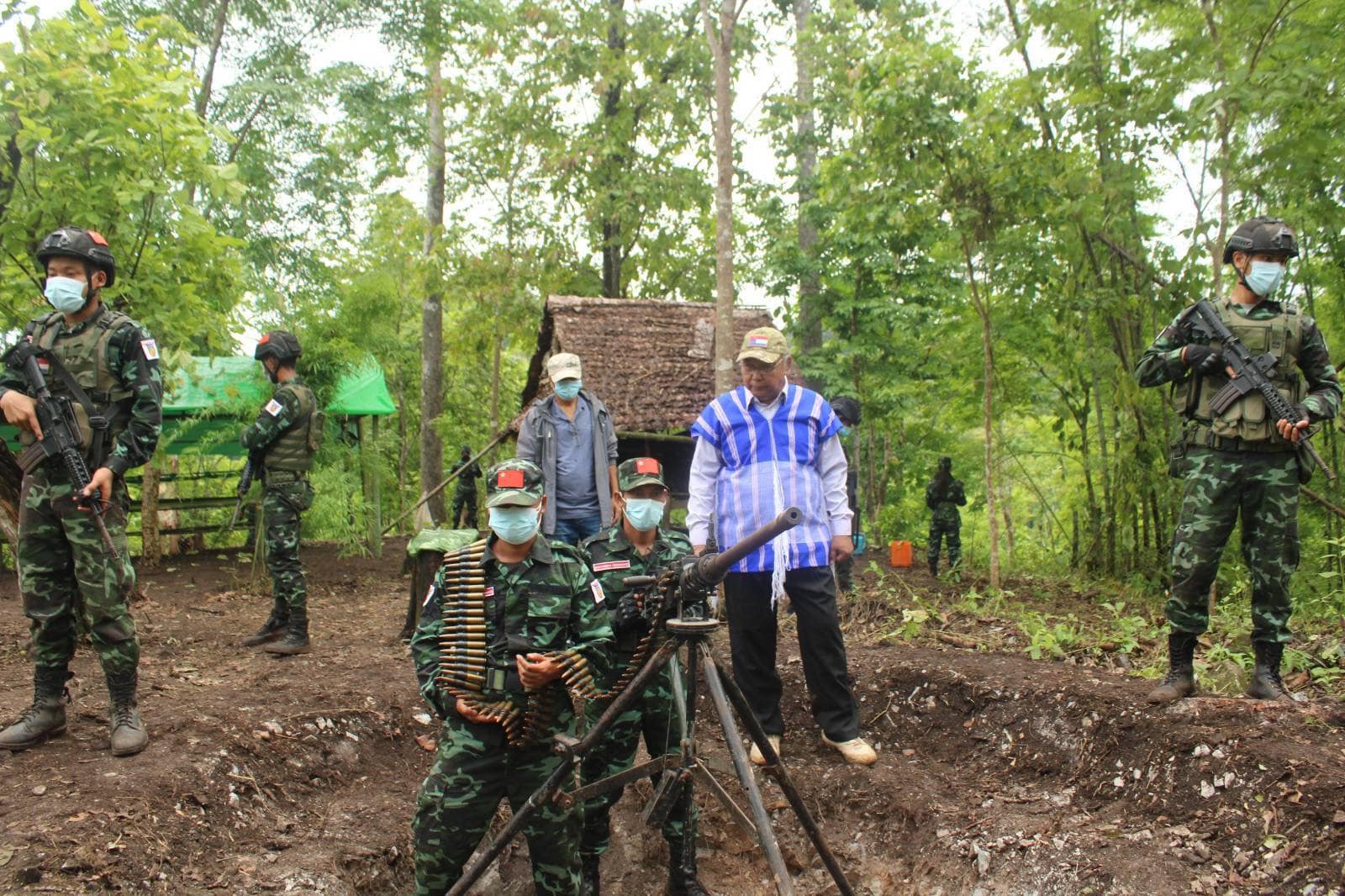
PDF and NUG Prime Minister Mahn Win Khaing Than
On October 27, 2023, EAOs such as the Ta’ang National Liberation Army (TNLA), the Myanmar National Democratic Alliance Army (MNDAA), the Arakan Army (AA), as well as KNDF, BNRA, BPLA, MDY-PDF, DPLA, PLA and others formed a coalition and launched Operation 1027 in northern Shan State and Mandalay Region.
Afterward, TNLA and MNDAA reached agreements with the Myanmar military to secure control over their desired territories and guarantee national interests. Following those agreements, they distanced themselves from the PDFs.
Similarly, the Kachin Independence Army (KIA) and Arakan Army (AA), having already captured strategic territories in Rakhine State, Kachin State, and parts of Sagaing Region with the support of PDFs, are believed to be maintaining communication and coordination with the Myanmar military for negotiations, according to informed sources.
Analysts point out that while PDFs continue fighting the Myanmar military, they still lack firm territorial control and do not yet have the capability to threaten central power in Nay Pyi Taw.

- By CNI
- Category: English Section
- Hits: 275
CNI News
8 December 2025
It has been learned that residents from villages such as Takhwettha, Khonan, Khobyin, Khamo, and others in Banmauk Township, Sagaing Region, have fled into territory controlled by the Shanni Nationalities Army (SNA) Brigade 614.
Residents from those villages, who had earlier fled into areas controlled by the joint forces of PDF–KIA–Kadu, reportedly returned and moved toward SNA-controlled areas on December 4, 2025, due to a lack of food supplies in the areas where they had sought refuge.
A local resident said,“Some villagers from Takhwettha, Khonan, Alat, Kan, Khobyin, and Khamo arrived in areas controlled by the PDFs. Now the PDF–KIA side is no longer providing any food supplies, so they had to secretly come back. Fellow villagers went to bring them back, and now they have fled into areas under SNA control. Here, arrangements for food and shelter have been provided for them,” he said.
The KIA–PDF–Kadu joint forces attacked Banmauk town on September 15, 2025, and fully captured it on September 20.
After that, residents from the town of Banmauk and nearby villages fled into the western side of the area controlled by the SNA.
Currently, there are around 5,000 internally displaced persons sheltering within SNA-controlled territory.

- By CNI
- Category: English Section
- Hits: 227
CNI News
8 December 2025
Political analyst U Htet Aung Kyaw told CNI News that the public in Myanmar does not appear to be showing much excitement or movement regarding the upcoming election.
In Myanmar, Election Part (1) will be held on December 28, 2025; Election Part (2) will be held on January 11, 2026; and Election Part (3) will be held in the last week of January.
He said that, up to now, public interest in the upcoming election remains low, and that he has not yet seen any significant public enthusiasm.
He continued:“Whatever the case may be, compared with the 2010, 2015, and 2020 general elections, we can say that public interest in the 2025 general election has dropped significantly. Up to this moment, the only thing that can be called active or vibrant is the fact that the Election Commission has issued an excessive number of rules and regulations.They have made the rules and regulations extremely strict. Also, in some townships certain matters are tightly controlled, while in other townships they are not strictly controlled at all. When such inconsistencies exist, politicians and parties face some constraints in their activities.Compared with the previous three elections, this one is noticeably calm and quiet.”
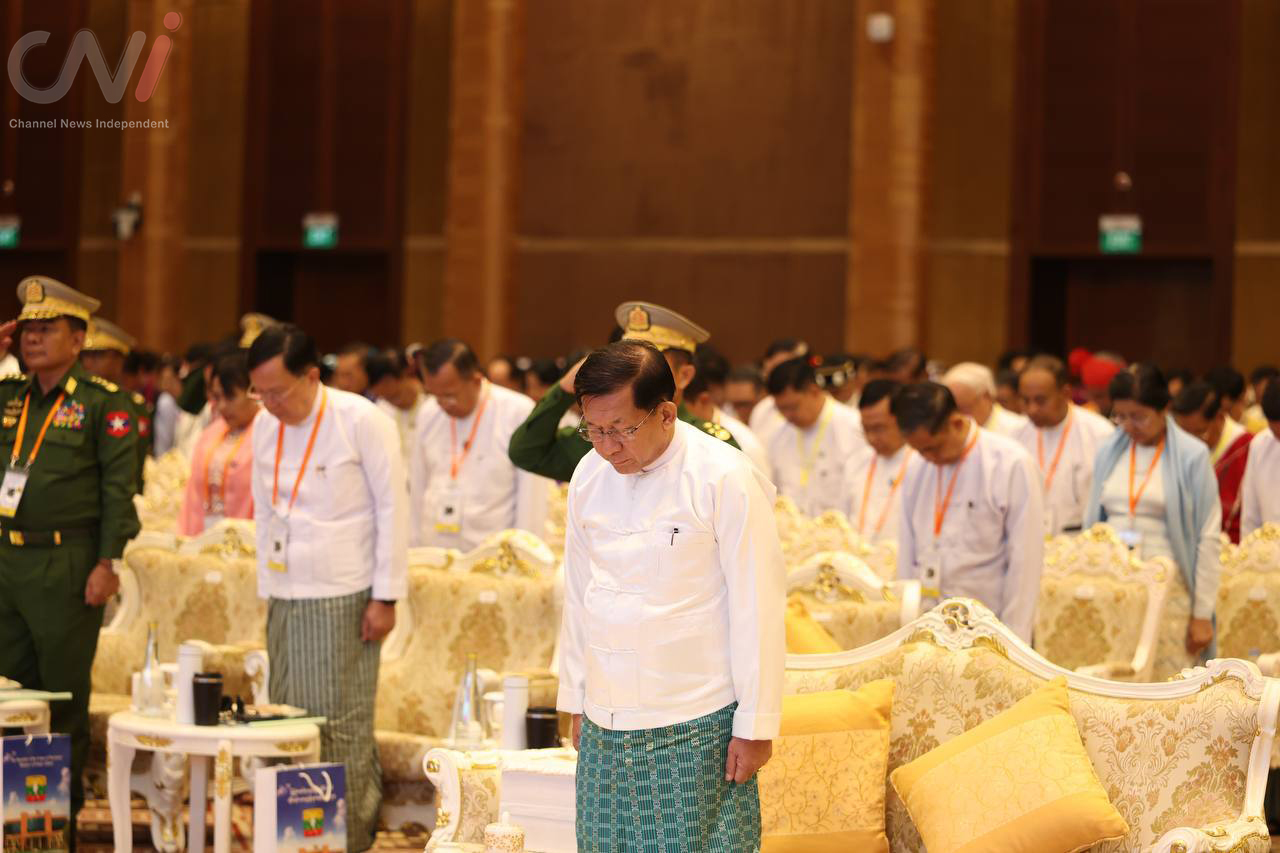
Government led by Senior General Min Aung Hlaing
He also pointed out that political parties need to make strong efforts to help the public understand that the election is an important starting point for the country.
U Thein Tun Oo, Director of the Strategic Studies Group, also told CNI News that when there is a misunderstanding about elections, various opinions and comments tend to arise, and it is important to understand election practices.
He said:“First of all, to return to the electoral path, we must hold an election. When an election is held, we must try to conduct it as best and as effectively as possible. Earlier I mentioned Free and Fair Elections. While such standards are based on normal elections, in situations like the current one—where an election is being held amidst many difficulties—we cannot proclaim Free and Fair everywhere.That is a challenge. If we cannot declare it Free and Fair, does that mean it is not Free and Fair? That is also not correct. What it means is that we must try our best to make it as Free and Fair as possible.We cannot insist on holding onto the fixed idea that unless it is truly Free and Fair everywhere, we will not accept it. This is an election held as part of a transition, so there will naturally be needs and limitations. But it is important to overcome these challenges and to understand all the usual practices of elections in order for elections to be held regularly.When there is a lack of understanding, various comments and views will arise. That’s why there is nothing particularly surprising. These situations occur because there is a misunderstanding of the nature of elections.”
Revolutionary forces have announced that people should not vote or take part in the election, and that those who cooperate with the election organized by the military will be effectively punished.
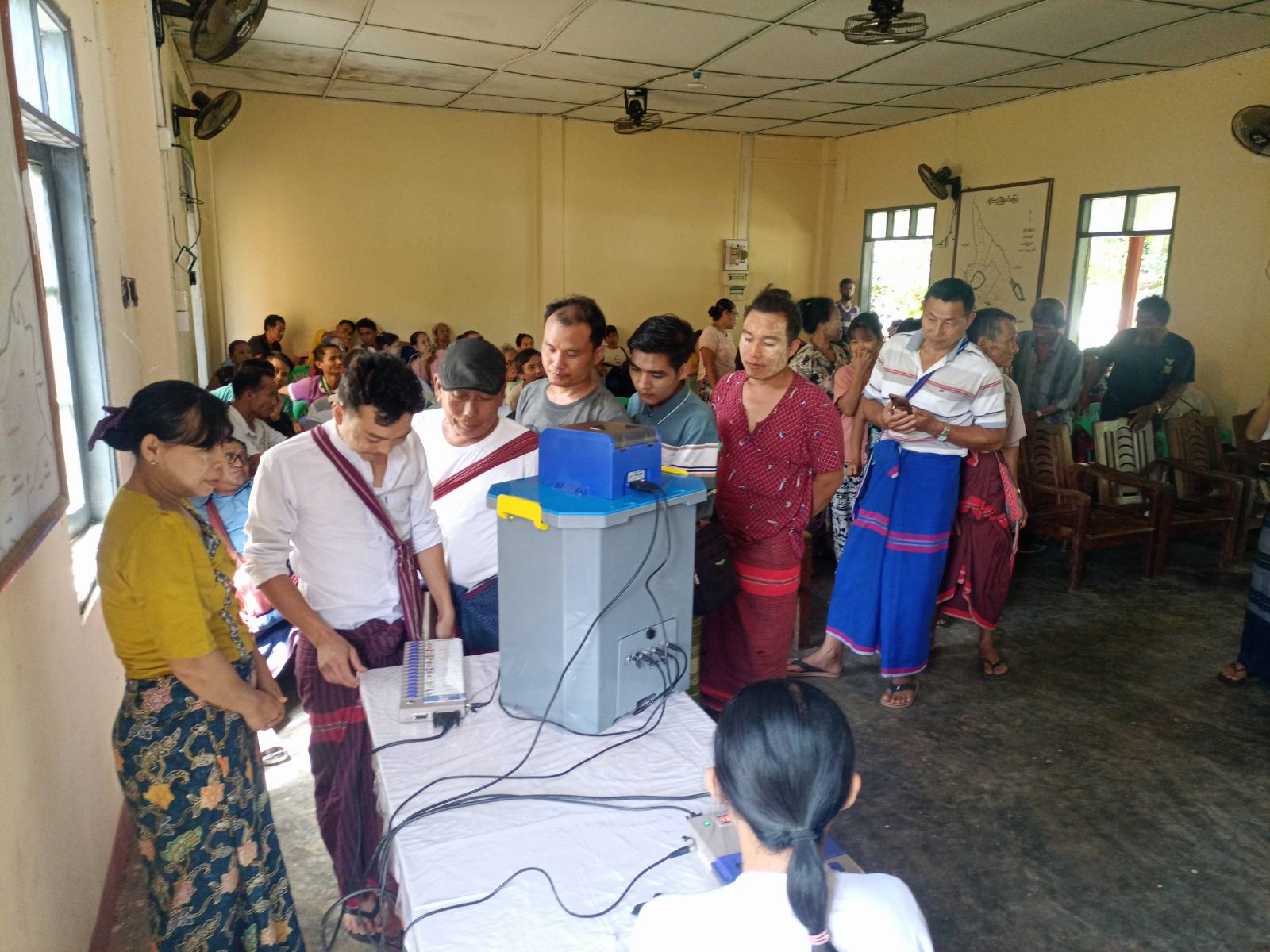
Citizens observing an election voting machine
As a result, many people are facing difficulties voting due to security concerns. Some citizens fear that although their names appear on the voter list, if they do not go to vote, ward administrators—who possess their household information—may use that against them. Therefore, some people remain hesitant about whether to vote or not.
Observers also note that public interest in the election has weakened because many people believe that even after the election, no significant change will occur, as the new government could once again be led by the military and the USDP.
However, if the post-election government is formed in a style similar to the government under U Thein Sein, some changes could be possible.
If Senior General Min Aung Hlaing appoints someone he trusts as president and forms a government, there may be some degree of change. But if Min Aung Hlaing himself assumes the presidency and the government continues with current policies, then meaningful change is unlikely, analysts say.

- By CNI
- Category: English Section
- Hits: 284
CNI News
8 December 2025
Military and political analysts are assessing how the relationship between Belarusian President Lukashenko and Myanmar’s military leadership might impact Myanmar's political landscape.
Belarusian President Alexander Lukashenko arrived in Myanmar on the evening of November 27 on a goodwill visit.
This was his first-ever trip to Myanmar. On November 28, he met with Senior General Min Aung Hlaing.
Senior General Min Aung Hlaing has visited Belarus twice before, and since 2023, Myanmar has been sending military officers for further training not only to Russia but also to Belarus.
According to political analyst Sai Mein, this growing connection between the Myanmar military and Belarus is likely aimed at strengthening the army:
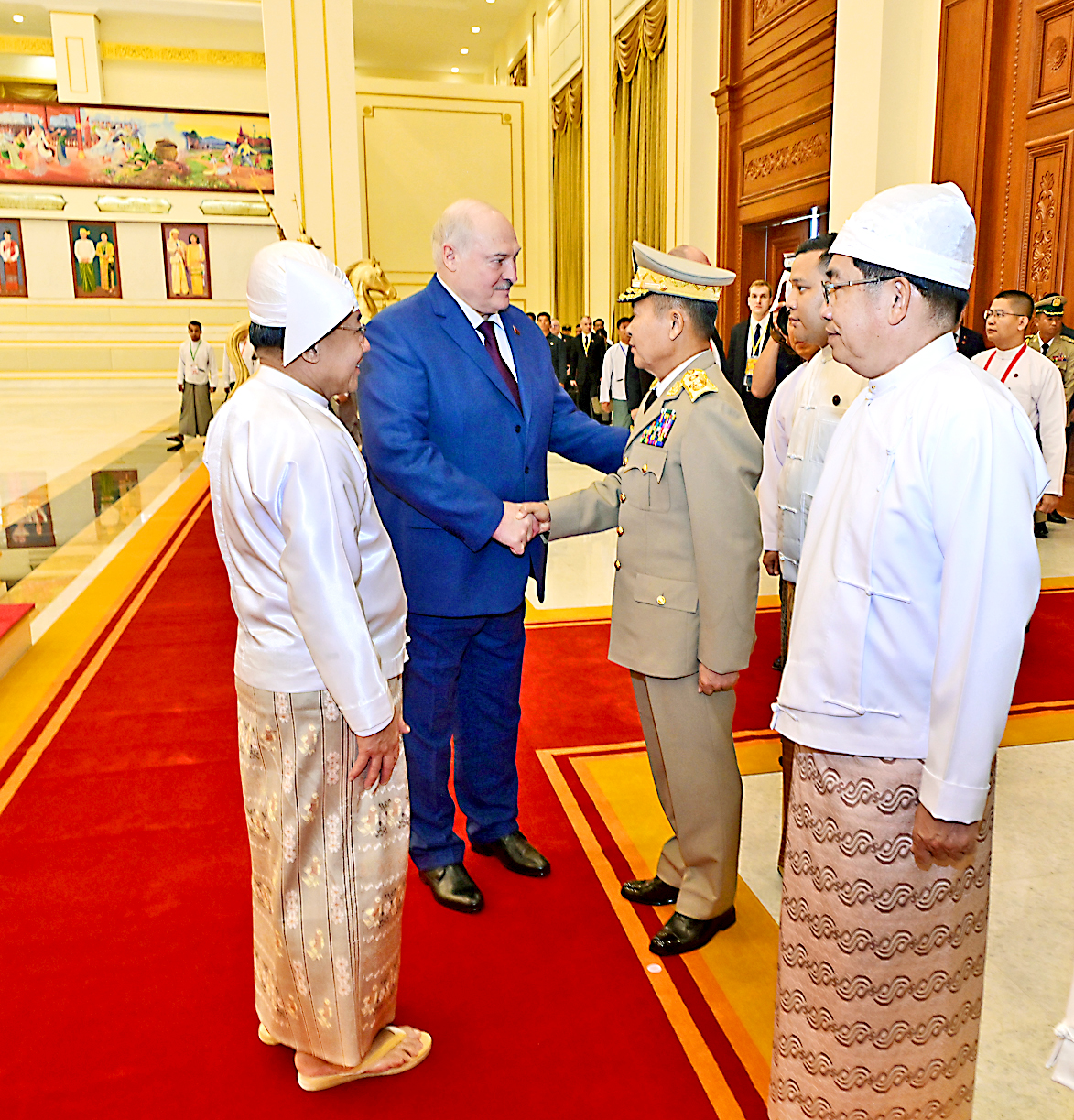
Senior General Min Aung Hlaing meeting Belarusian President Lukashenko
“Myanmar’s military leader has already visited Belarus twice. The main purpose is to obtain military support.After travelling to Russia and Belarus, the military council’s strength has grown again.For example, even groups like the TNLA—who were performing very strongly—had to retreat from areas like Nawnghkio, Kyaukme, and Hsipaw and could not maintain their positions.The main idea is whether they can move from building hydropower plants to building arms factories.So the military council’s connection with Belarus seems clearly aimed at strengthening military capabilities.”
During the meeting, Myanmar expressed its intention to join the Shanghai Cooperation Organization (SCO) as a member and to work toward membership in BRICS and the Eurasian Economic Union (EAEU).
Senior General Min Aung Hlaing requested that Belarus continue supporting Myanmar’s efforts in these areas.
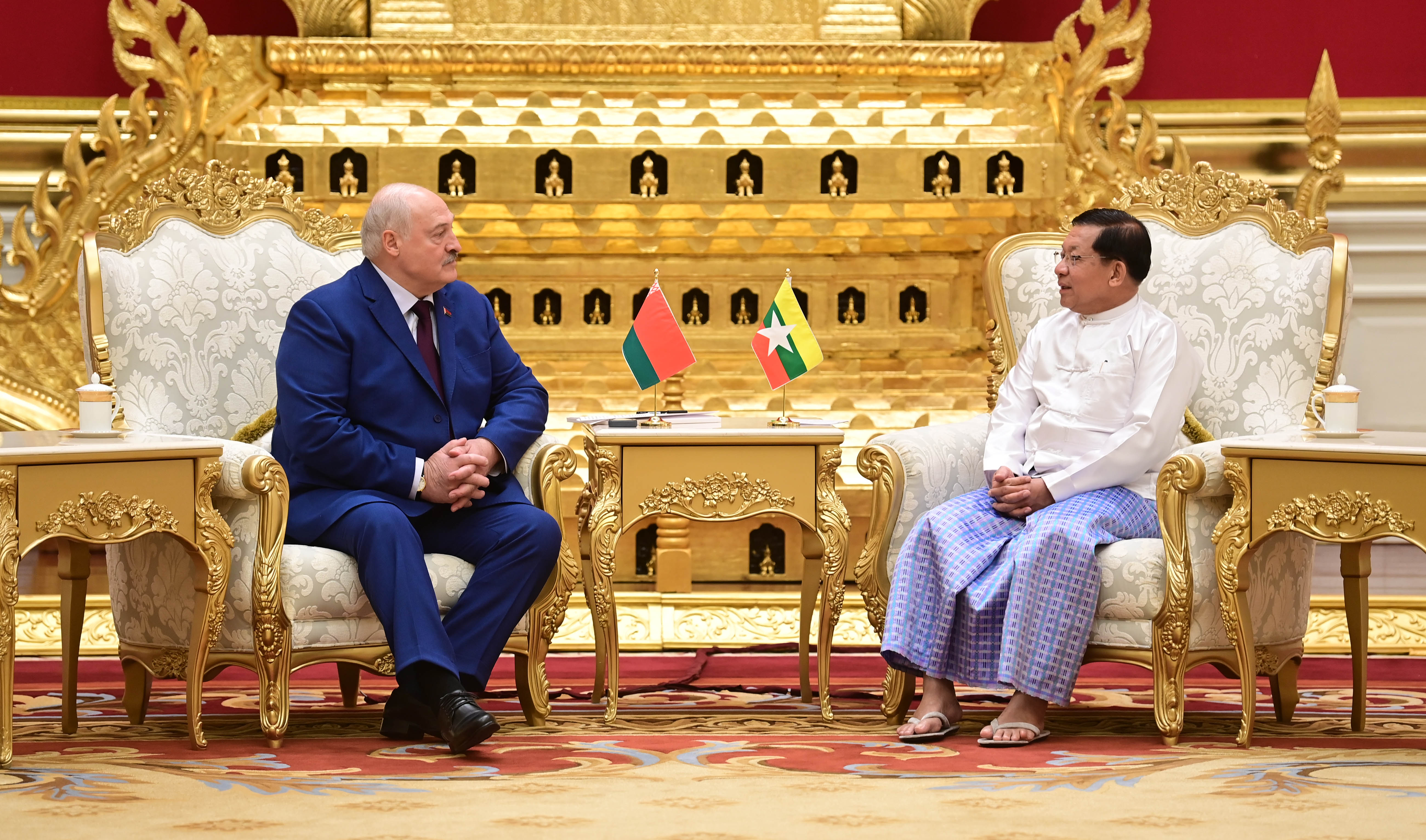
Senior General Min Aung Hlaing meeting Belarusian President Lukashenko
Both sides also discussed expanding cooperation in economic investment, education, healthcare, industry, agriculture, and military technology.
Myanmar will hold the first phase of its multi-party general election on December 28, 2025.
PNLO-NCA/S Chairman Colonel Khun Okka told CNI News that Lukashenko’s trip to Myanmar at this time also carries a message of Russian endorsement:
“This is reciprocal. Belarus is entering the picture based on the close strategic ties between Russia and Myanmar.If Russia cannot come directly, Belarus comes on Russia’s behalf. That shows Russia is supporting from behind.So it is mutual backing among them.Since the election is approaching, this visit can be seen as showing support for the upcoming election.”
President Lukashenko said that 2025 had been a memorable year for both countries.
He acknowledged that Myanmar would soon hold a historic election and stated the upcoming election was important for Myanmar.
He expressed his support for the election that Senior General Min Aung Hlaing plans to hold.
Both countries also signed several memoranda of understanding to enhance cooperation.

- By CNI
- Category: English Section
- Hits: 198
CNI News
6 December 2025
It is now time to clearly recognize that the rollback of democracy has been caused by the armed struggle, said Senior General Min Aung Hlaing, Chairman of the State Security and Peace Commission.
He made the remarks at the graduation ceremony of the 67th Intake of the Defence Services Academy held on December 3, 2025.
Senior General Min Aung Hlaing said:“The terrorist NUG and CRPH groups have falsely accused the Tatmadaw (Myanmar Armed Forces) of rolling back democracy and have indoctrinated young people with extremist ideas, pushing them onto the wrong path of armed violence.Because of these armed movements, the Union that we are striving to build has suffered heavy losses in human resources.For more than 70 years, attempts to resolve issues through armed struggle have never produced results.It is time to understand clearly that the rollback of democracy is due to the armed struggle.”
He added that if everyone shares the common goal of building a Federal Democratic Union, armed groups including the PDFs should prioritize the interests of the Union and enter the legal fold, as the State has already extended an invitation.
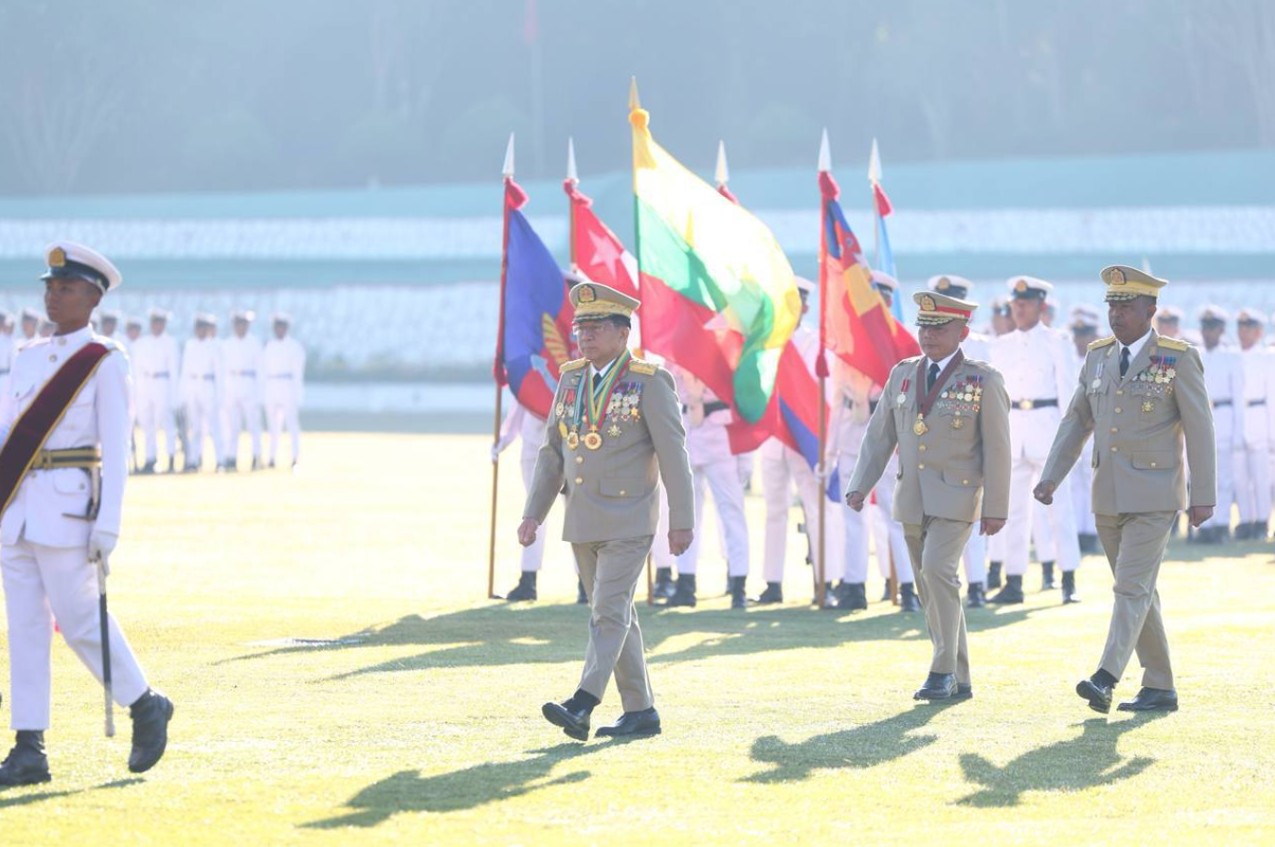
Senior General Min Aung Hlaing continued:“On the other hand, some ethnic armed organizations that had signed the NCA have broken their promises and diverted from the path of peace.Based on past peace experiences, the Tatmadaw has laid down a clear six-point peace policy.Peace can only be achieved through dialogue.So instead of only stating what they want, all sides must work together sincerely and realistically on what can be achieved.”
On February 1, 2021, the Myanmar military (Tatmadaw) seized power from the National League for Democracy (NLD) government, claiming they attempted to form a government without resolving disputes over the 2020 general election voter lists.
The military then declared a state of emergency and formed administrative bodies including the State Administration Council (SAC), the Caretaker Government, and the State Security and Peace Commission. These bodies have controlled the country to this day.
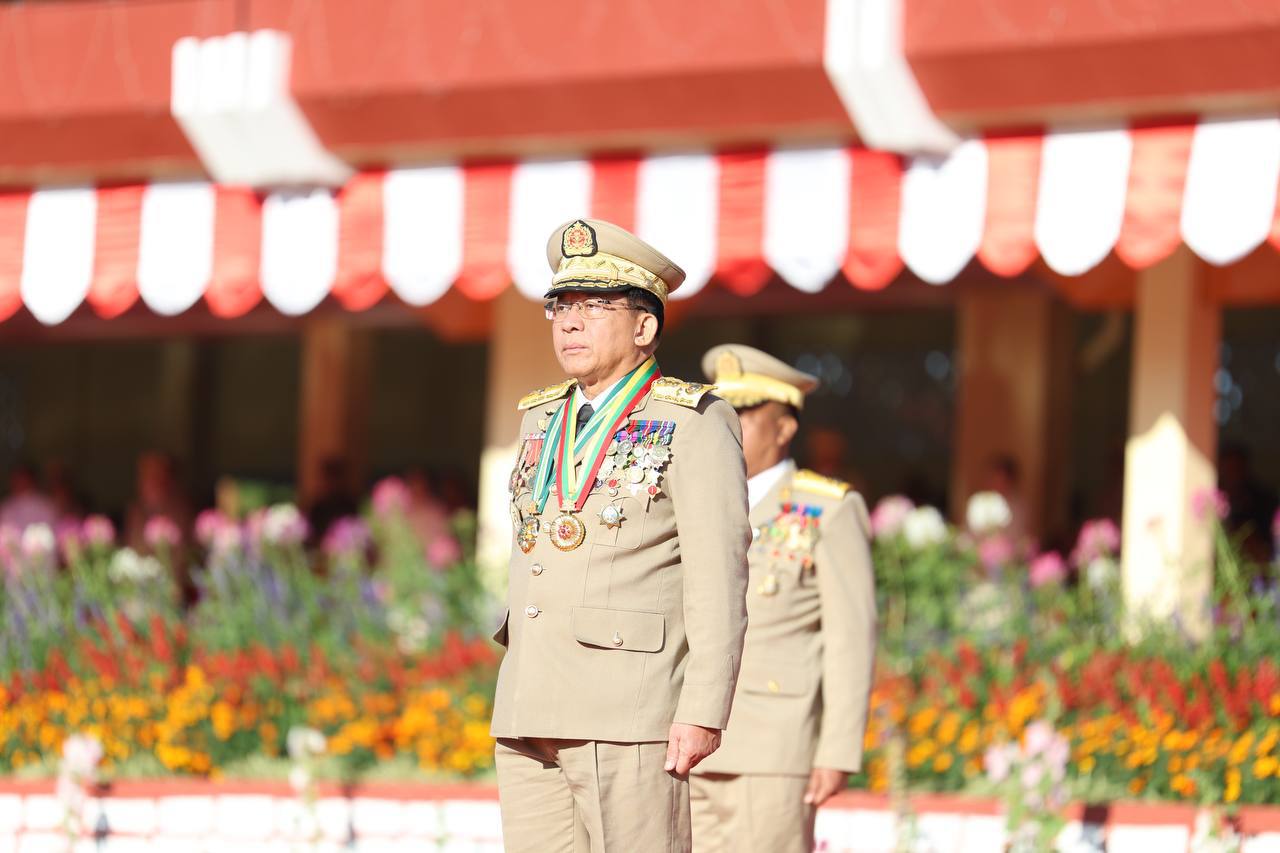
As a result, NLD leaders, elected lawmakers, armed groups, pro-democracy activists, civil society organizations, and artists opposed the coup and launched armed resistance to topple the military regime.
The armed conflict has since spread across the entire country, displacing more than three million civilians and destroying hundreds of thousands of homes and buildings.
Senior General Min Aung Hlaing has also stated that elections will be held in three phases—Phase (1) on December 28, 2025; Phase (2) on January 1, 2026; and Phase (3) in the last week of January 2026—and that state power will be handed over to the winning party.

- By CNI
- Category: English Section
- Hits: 338
CNI News
6 December 2025
Military and political analysts say that because the National League for Democracy (NLD) will not be participating in the upcoming multi-party democratic general election, there is little chance that the ongoing armed conflicts will see any significant change.
The NLD, which has traditionally won the majority of votes in Myanmar elections, is not registered as a political party in the election scheduled to begin on December 28, 2025.
A political analyst told CNI News that the absence of the NLD in the election is a key reason why no major shift can be expected in the current armed conflicts.
He said:“Not allowing—or not having—the NLD in the election is the main reason why the ongoing armed clashes will not see significant change.There is one thing though. After the election, will they allow the NLD to participate in a by-election like during President Thein Sein’s administration? If that happens, then we could hope for something similar to what occurred under Thein Sein’s government.But it’s doubtful whether such a situation will return. Why? Because future leaders like Senior General Min Aung Hlaing and USDP Chairman U Khin Yi are not as flexible as U Thein Sein. And I don’t think they will engage actively in reforms like U Thein Sein did. If they don’t take that approach, such circumstances will not easily occur.If the NLD were gradually allowed to participate again in elections in areas where PDFs and the NUG are active, and if they regained some parliamentary seats, then expectations would rise that things might improve—just like during the by-election period under Thein Sein’s administration.”
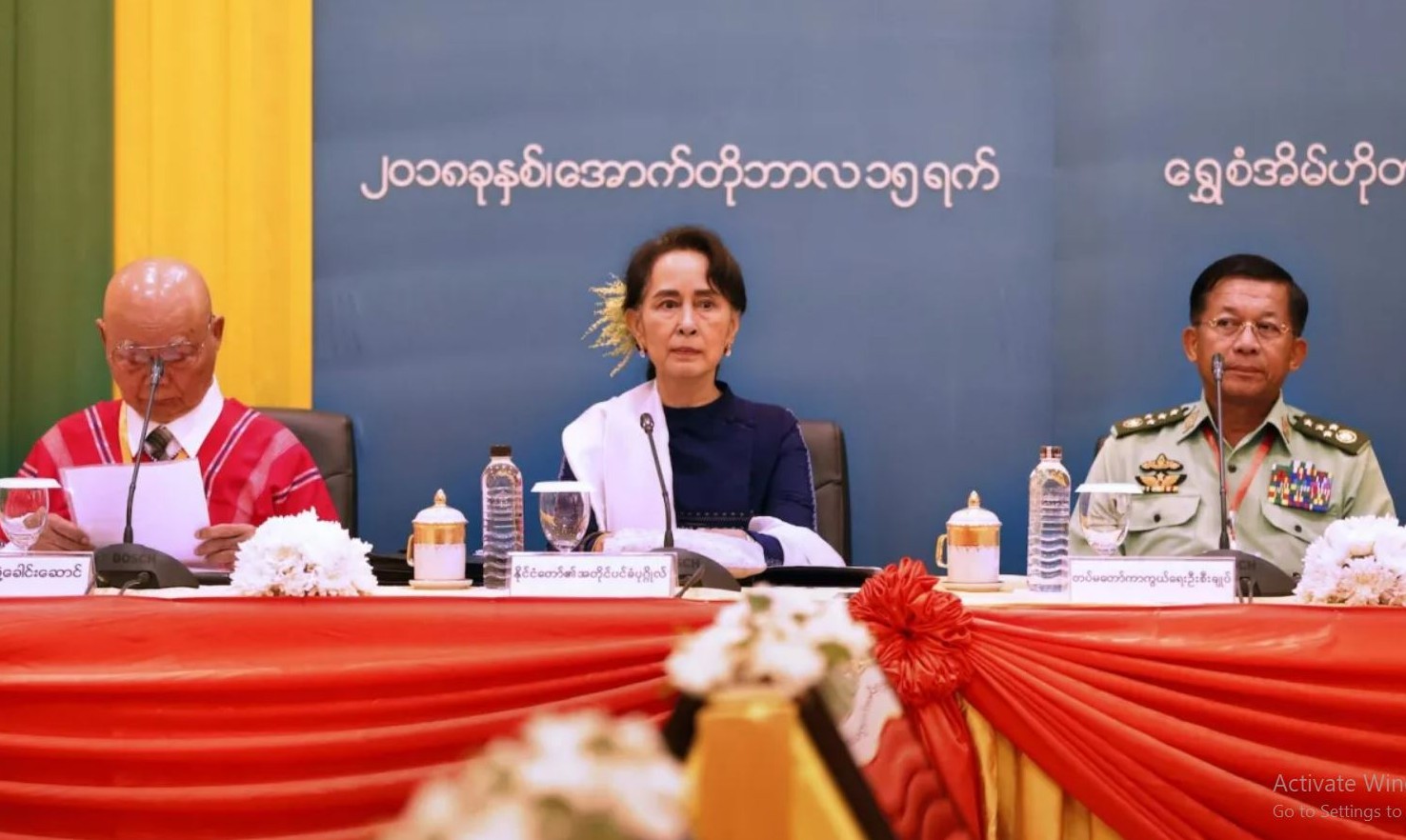
Daw Aung San Suu Kyi, Senior General Min Aung Hlaing, Former KNU Chairman
On February 1, 2021, the Myanmar military (Tatmadaw) removed the NLD government led by Daw Aung San Suu Kyi, claiming that disputes over voter lists from the 2020 general election were unresolved, and subsequently detained Daw Aung San Suu Kyi and U Win Myint.
In addition, key founding members and senior leaders of the NLD—patron U Tin Oo, vice-chair Dr. Zaw Myint Maung, and spokesperson for public relations and communications Monywa Aung Shin—have since passed away.
Although several political detainees have recently been granted amnesty, Daw Aung San Suu Kyi has not yet been released, leading some military and political observers to speculate that she might be freed after the election.
U Khun Sai, who works in peace processes, told CNI News that in a political landscape where Daw Aung San Suu Kyi is absent, revolutionary forces could either grow stronger or experience a decline in morale.
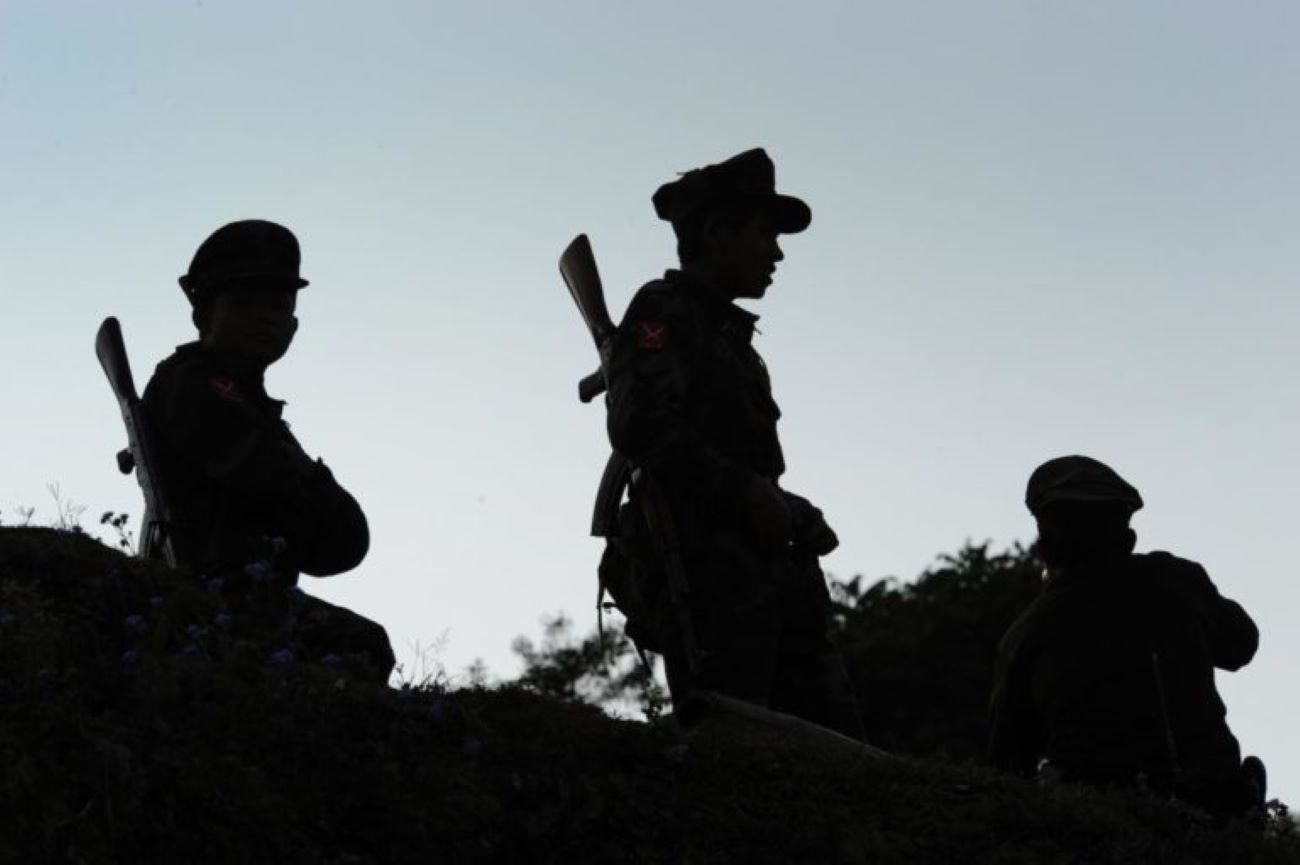
Armed resistance groups
He said:“Right now, what we see across the country cannot yet be described as a full-scale uprising, even though many think it is.One reason it isn’t is because many people still hold hopes for Daw Su. Because of that, they aren’t fully participating.However, if Daw Su was no more or if the NLD completely ceased to exist, our revolutionary forces could grow even stronger. On the other hand, some argue that without Daw Su, the morale of those fighting under her influence could fall sharply.We will have to wait and see which of these two possibilities becomes reality.”
Military and political analysts also say that Daw Aung San Suu Kyi is someone who ought to be included in discussions and negotiations aimed at resolving Myanmar’s political crisis and armed conflicts.

- By CNI
- Category: English Section
- Hits: 167
CNI News
5 December 2025
Political analysts point out that Myanmar’s political environment has become tarnished because of people who exploit politics for personal gain.
The public has not lost trust in politicians, they say. Rather, people have become fearful, and politics itself has gained a bad name because of those who manipulate it for selfish purposes. Daw Sanda Min, an independent candidate from Latha Township, told CNI News:
“It’s not that people don’t trust politicians. They are fearful—there are many things that have caused fear. After what happened post-2021—the incidents, the political figures, and those calling themselves revolutionaries—their ways of operating have frightened the public, frightened them away from politics. People have faced terrifying situations that would scare anyone. So, I see it more as fear rather than distrust.It’s not that there is no trust. Every country has politicians. Among them, there are good people and bad people, and there are those who exploit politics. So, it’s not that people have lost trust in politicians—they are afraid. Because of those who exploit politics, the political sphere has become tainted.”
On February 1, 2021, Myanmar’s military (Tatmadaw) removed the NLD government, declared a state of emergency, and has ruled the country since.
Analysts note that in this situation, political parties, politicians, and armed groups have taken advantage of the people's lives and resources for their own benefit, while failing to solve or protect the public from their hardships. They only come close to the public during election periods when they need votes, speaking of “the people” without sincerity.
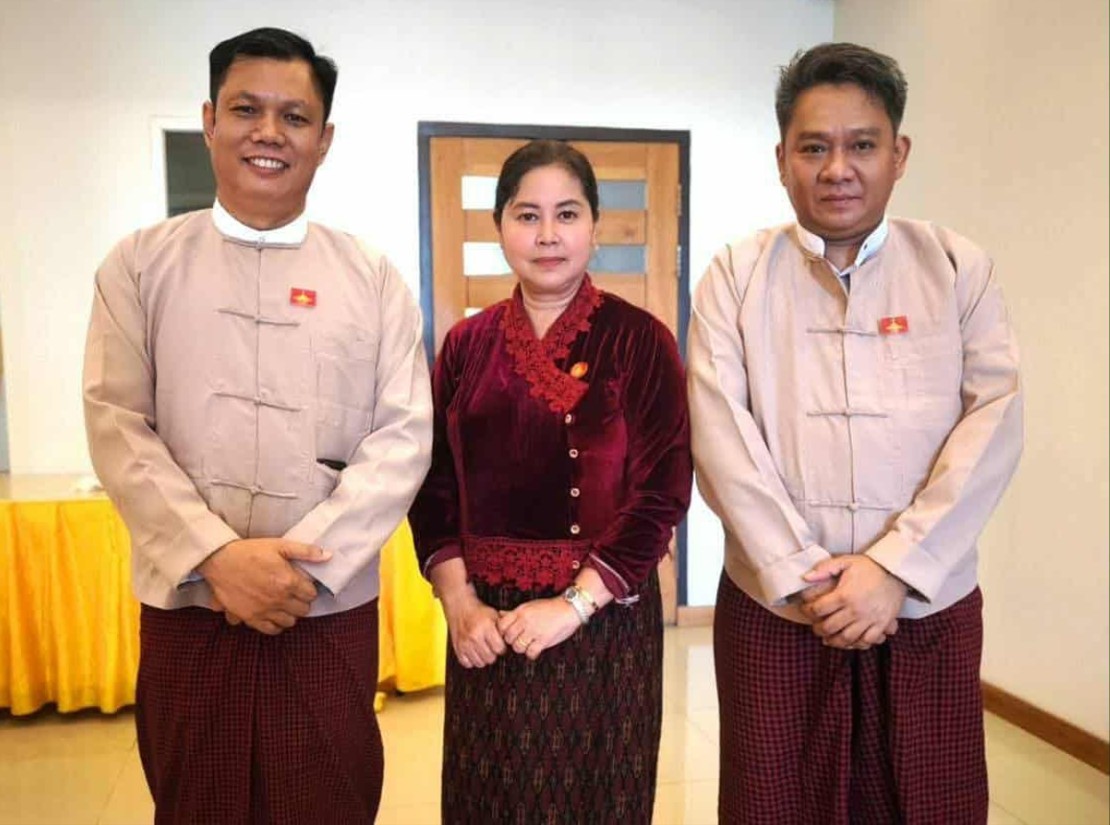 Daw Sanda Min and U Htet Aung Kyaw
Daw Sanda Min and U Htet Aung Kyaw
Political analyst U Htet Aung Kyaw told CNI News that the desire to engage in politics—whether with good intentions or bad—should be allowed as long as it does not violate the law:
“This is the real situation. People who have founded parties have to attend national events. Once they do, they build connections with those in power and take advantage of those relationships.It’s not that they genuinely want to represent the public or have ideas for how to improve the country.So it’s understandable when people say politics is full of those who exploit it. Ultimately, the public will decide who is who.According to a citizen’s political rights, anyone may establish a political party or enter politics—whether their intentions are good or bad—as long as they do not break the law.Banning a person from forming a political party just because they are a businessperson is not something that can be done easily.”
U Shwe Mann has previously said that in order to prevent opportunists from infiltrating politics, the public must be politically knowledgeable.
Analysts also note that since political changes took place over the past four years, Myanmar has again ranked among the world’s worst countries in corruption indicators—an alarming situation.
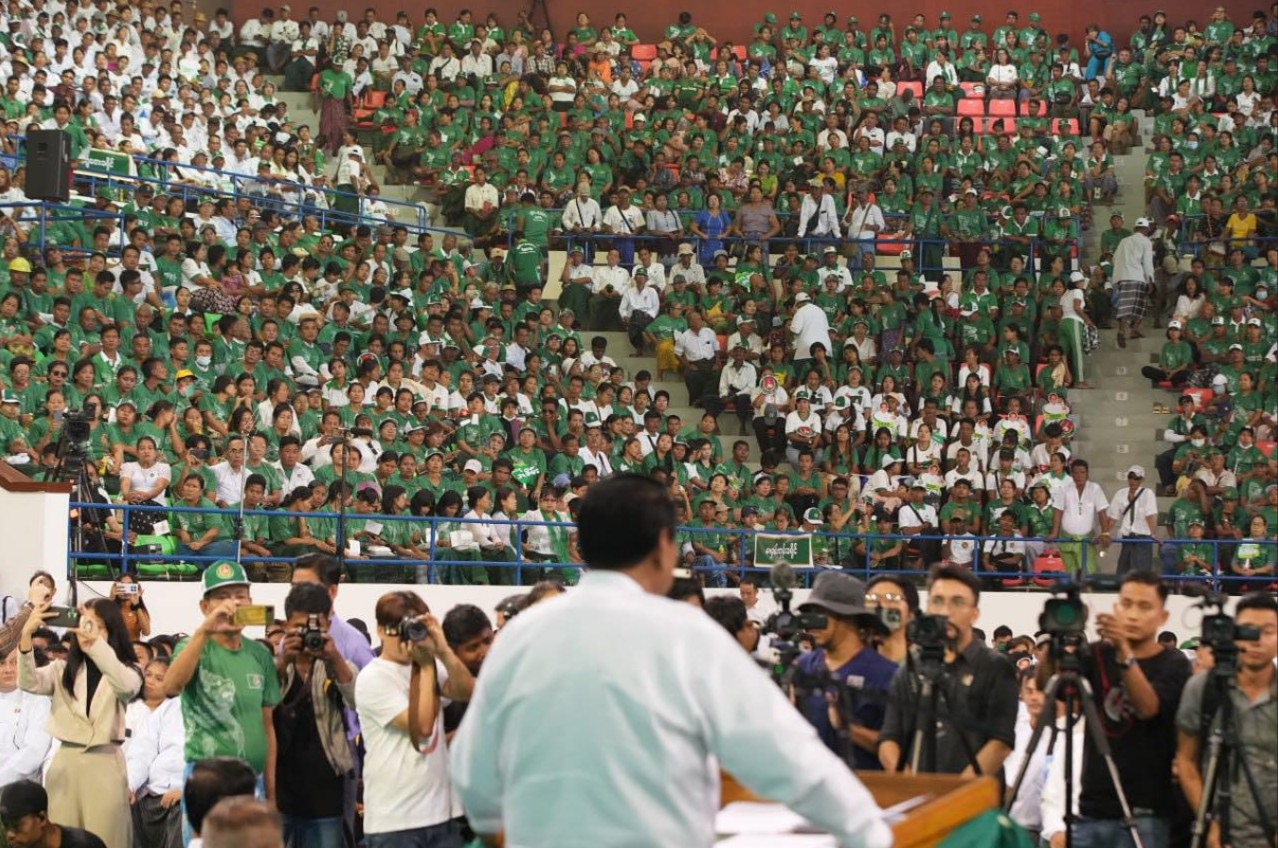
USDP campaigning
Dr. Aung Myo, an independent candidate running in Zabuthiri Township, Nay Pyi Taw, said that once people gain political positions and authority, many cannot restrain themselves and begin to betray principles:
“People who exploit politics exist in every country. Human beings have ego. If they have political interest, they pursue politics.
Politics is not as ruined as people say—there is nothing irreparably damaged. Those who exploit politics simply continue what they have always done.
But yes, when people enter politics without the right intentions, that part is true.
Everyone works for themselves. When they begin gaining positions and authority, they cannot control themselves and end up betraying principles.
It’s not always about exploiting politics—it’s because, generation after generation, we Burmese lacked good administrative systems, our rights were restricted, and we were not allowed proper governance.
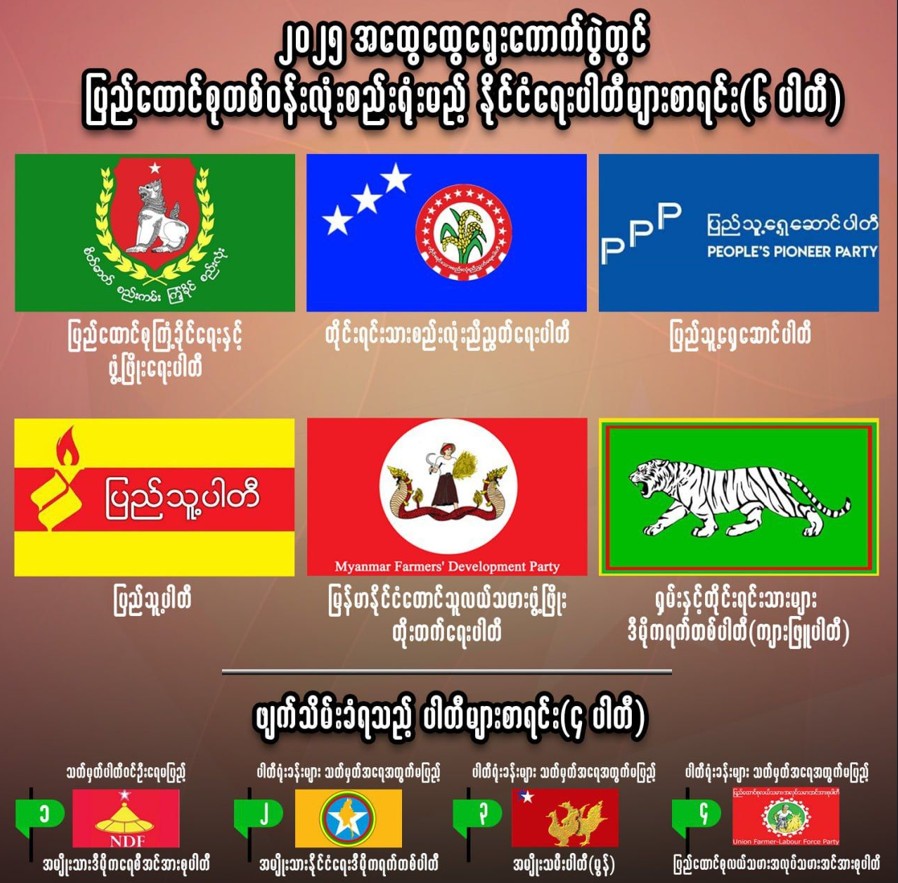
Dissolved parties and the parties preparing to contest the election
If the system were good, such exploitation would not happen. When the military seized power, there was no one to restrain them. That is simply their nature.”
Political analysts say Myanmar has an excessive number of political parties, many of which have never won an election. Yet they attend party-founding meetings, build connections with authorities, and pursue personal interests.
Despite founding parties and attending political discussions, many still lack proper understanding of federalism and democratic principles.



